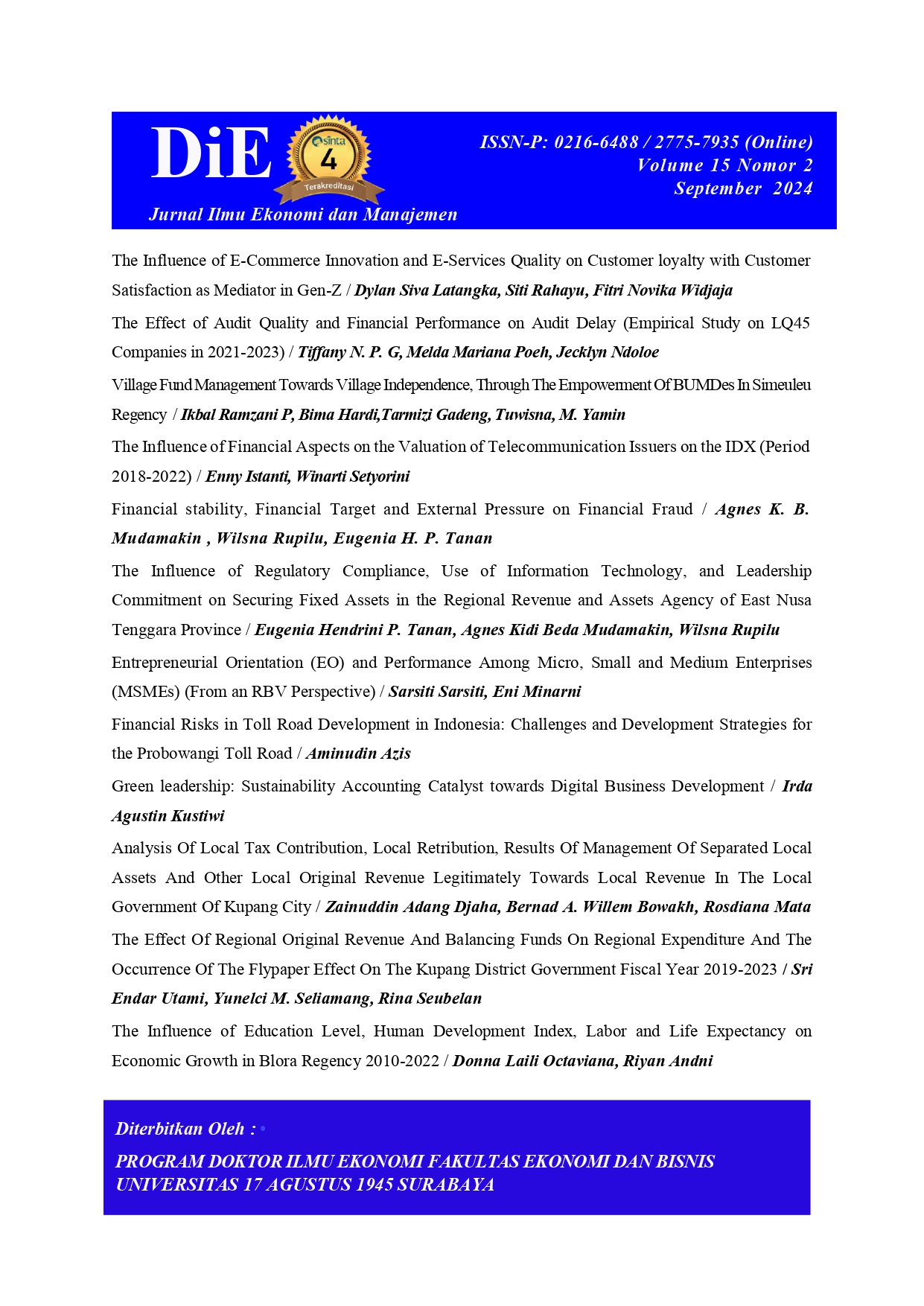The Effect of Audit Quality and Financial Performance on Audit Delay (Empirical Study on LQ45 Companies in 2021-2023)
DOI:
https://doi.org/10.30996/die.v15i2.11903Keywords:
Audit Delay, Profitability, Leverage, Audit QualityAbstract
The financial report is an information medium that is very useful for stakeholders. The financial statements owned by the company can be used for stakeholders to make decisions. Financial statements presented by companies must be audited because audited financial statements can increase the confidence of financial statement users. One of the important factors in financial statements is timeliness. Financial statements can be very useful if financial statements are presented on time, therefore the financial statements presented must be timely so that decision-making can also be taken appropriately. The purpose of this study is to see what factors can affect audit delays. Audit delay is the time difference between the closing date of the book and the date of signing the auditor's report. The sample in this study is companies with the LQ45 index, because LQ45 index companies are companies that have a healthy financial condition. Data will be taken from the Indonesia Stock Exchange website for 3 years. Data analysis will be carried out using SPSS by performing the Classical Assumption Test and the Multiple Linear Regression Test. The targeted output is journal publication in accredited national journals.
Keywords: Audit Delay, Profitability, Leverage, Audit Quality
Downloads
References
Amani, FAA, Waluyo I. (2016). Pengaruh Ukuran Perusahaan, Profitabilitas, Opini Audit Dan Umur Perusahaan Terhadap Audit Delay (Studi Empiris Pada Perusahaan Property Dan Real Estate Yang Terdaftar Di Bursa Efek Indonesia Pada Tahun 2012-2014. Jurnal Nominal. 5. 1.
Arumsari, Vivien F, Nur H. (2017). Pengaruh Kepemilikan Saham, Profitablitas, Laverage, dan Opini Auditor Terhadap Audit Delay . Jurnal Ilmu dan Riset Akuntansi Vol.6 (4);
Bursa Efek Indonesia. Laporan Keuangan dan Tahunan. Diakses dari www.idx.co.id,www.idx.co.id
Candra M. (2015). Faktor-Faktor yang Mempengaruhi Audit delay pada Perusahaan Manufaktur di Bursa Efek Indonesia. Universitas Islam Negeri Sultan Syarif Kasim Riau.
Dianova, A, Mildawati T, Kurnia K. (2021). Effect of Leverage, Profitability and Audit Committee on Audit Delay with KAP Reputation as Moderating Variable. Budapest International Research and Critics Institute (BIRCI-Journal): Humanities and Social Sciences, 4(3), 3906–3916.
Febrianty. (2015). Faktor - Faktor yang Berpengaruh Terhadap Audit delay Perusahaan Sektor Perdagangan yang Terdaftar di BEI Periode 2007-2009. Jurnal Ekonomi dan Akuntansi. (1).
Ghozali I. (2018). Aplikasi Analisis Mutivariate Dengan Program IBM SPSS 25, Edisi 9, Badan Penerbit Universitas Diponegoro.
GoTommy, Feryanto G, Lilis A. (2020). Pengaruh kinerja keuangan dan kualitas audit terhadap audit delay. Jurnal Ilmu dan Riset Akuntansi.
Harahap. (2015). Analisis Kritis atas Laporan Keuangan. Edisi 1-10. Rajawali Pers. Jakarta.
Ikatan Akuntan Indonesia (IAI). (2017). Pernyataan Standar Akuntansi Keuangan (PSAK) No 1 : Penyajian Laporan Keuangan . Jakarta : IAI.
Kowanda, D, Pasaribu R, Fikriansyah. (2016). Audit Delay di Bursa Efek Indonesia. Jurnal Riset Akuntansi & Keuangan, 12, 1-4.
Lapinayanti, N, Budiartha. (2018). Pengaruh Profitabilitas dan Leverage Pada Audit Delay dengan Ukuran Perusahaan Sebagai Pemoderasi. E-Jurnal Akuntansi 23(2): 1066-1092.
Lestari, Nuryatno (2018) Factor affecting the audit delay and its impact on abnormal return in Indonesian stock exchange. International journal of economics and finance Vol 10(02) 1916-9728.
Mulyadi. (2016). Auditing (Buku 1). Salemba Empat. Jakarta.
Nadia I, Djati K. (2020). Factors Affecting Audit Delay on Companies in Indonesia. Journal of Accounting Science and Technology,1(1).
Ningsih, Gusti A, Ni Luh S. (2015). Pengaruh Ukuran Perusahaan, Laba Operasi, Solvabilitas dan Komite Audit pada Audit Delay. E-Jurnal Akuntansi Universitas Udayana, Hal. 481-495.
Prabasari IAAR, Merkusiwati. (2017). Pengaruh Profitabilitas, Ukuran Perusahaan, Dan Komite Audit Pada Audit Delay Yang Dimoderasi Oleh Reputasi KAP. E-Jurnal Akuntansi Universitas Udayana 20(2): 1704-1733.
Prameswari AS, Yustrianthe RH. (2015). Analisis Faktor- Faktor Yang Mempengaruhi Auidt Delay (Studi Empiris Pada Perusahaan Manufaktur Yang Terdaftar Di Bursa Efek Indonesia). Jurnal Akuntansi. 19.50-67.
Prasilya, K. (2015). Pengaruh Corporate Govarnance terhadap Nilai Perusahaan dengan Kinerja Keuangan sebagai Variabel Moderating. Jurnal Ilmu dan Riset Akuntansi, (4) 8.
Puspitasari E, Sari AN. (2012). Pengaruh Karakteristik Perusahaan Terhadap Lamanya Waktu Penyelesaian Audit (Audit Delay) Pada Perusahaan Manufaktur Yang Terdaftar Di Bursa Efek Indonesia. Jurnal Akuntansi & Audit. 5.1-96.
Setyarani T. (2020). Faktor-faktor Yang Mempengaruhi Lamanya Waktu Penyelesaian Audit (Audit Delay) (Studi Empiris pada Perusahaan Manufaktur yang Terdaftar di Bursa Efek Indonesia Periode 2015-2017.
Setyawan. (2016). Analisis Faktor-Faktor Yang Mempengaruhi Audit delay. (Studi Empiris Pada Perusahaan Aneka Industri dan Keuangan di BEI Tahun 2012-2014). Fakutas Ekonomi dan Bisnis UMS Surabaya.
Syachrudin D, Nurlis. (2018). Influence of Company Size, Audit Opinion, Profitability, Solvency, and Size of Public Accountant Offices to Delay Audit on Property Sector Manufacturing Companies Listed in Indonesia Stock Exchange. International Journal of Scientific & Technology Research, 7(10), 106-111.
Wulandari NW, IMK Utama. (2016). Reputasi Kantor Akuntan Publik Sebagai Pemoderasi Pengaruh Profitabilitas Dan Solvabilitas Pada Audit Delay. E-Jurnal Akuntansi Universitas Udayana 17(2): 1455-14.
Yulianti A. (2011). Faktor- Faktor yang Berpengaruh terhadap Audit Delay, (Studi Empiris Pada Perusahaan Manufaktur yang Terdaftar di Bursa Efek Indonesia). Universitas Negeri Yogyakarta.
Downloads
Published
Issue
Section
License
The author who will publish the manuscript at DiE: Jurnal Ilmu Ekonomi dan Manajemen, agree to the following terms:
1. Authors retain copyright and grant the journal right of first publication with the work simultaneously licensed under a Creative Commons Attribution ShareAlike License that allows others to share the work with an acknowledgment of the work's authorship and initial publication in this journal.
2. Authors are able to enter into separate, additional contractual arrangements for the non-exclusive distribution of the journal's published version of the work (e.g., post it to an institutional repository or publish it in a book), with an acknowledgment of its initial publication in this journal.
3. Authors are permitted and encouraged to post their work online (e.g., in institutional repositories, pre-prints sites or on their website) prior to and during the submission process, as it can lead to productive exchanges, as well as earlier and greater dissemination of published work








